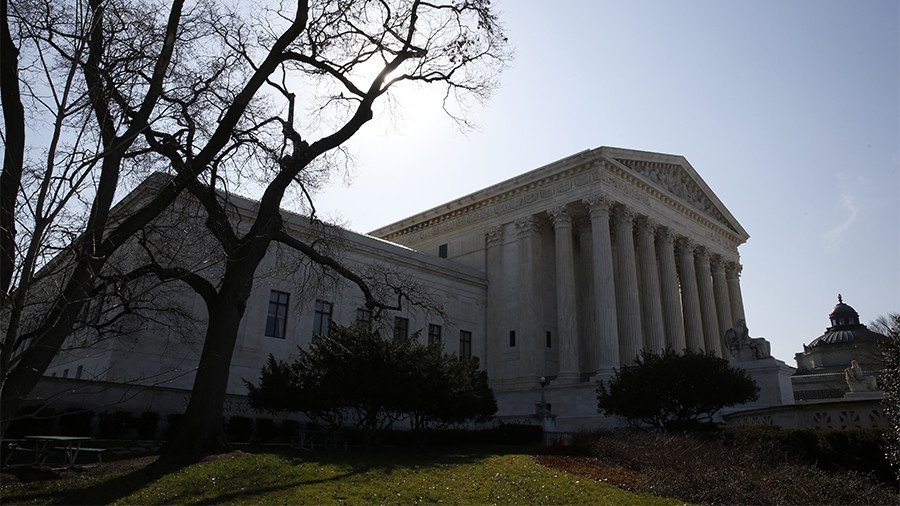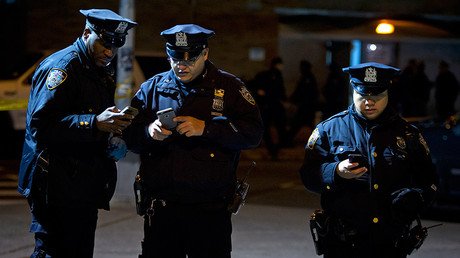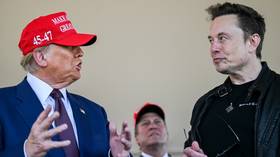Supreme Court justices signal in favor of cell phone privacy

A string of robberies could end up having a major impact on technological privacy rights in the US, after Supreme Court justices expressed concern over warrantless cell phone tower data usage during a hearing on the case.
Supreme Court justices heard a case on Wednesday in which authorities obtained 127 days of information from cell phone towers to demonstrate that a suspected criminal was in the vicinity of the robberies. The information was obtained without a warrant, sparking a legal battle that reached the nation’s highest court.
The justices signaled that there may be bipartisan agreement on the case.
“Most Americans, I think, still want to avoid Big Brother,” Justice Sonia Sotomayor said, referring to the totalitarian security apparatus in George Orwell’s classic dystopian novel, “1984.”
Chief Justice John Roberts pointed out that having a cellphone is a matter of necessity, not choice.
I believe this was probably the most significant part of oral arguments: Roberts, citing Riley, argued that cellphones should be treated as a necessity of modern living, not a voluntary choice.Incredibly important for privacy rights in Digital Age pic.twitter.com/oGUyu0Ud7m
— 🤔Jake Laperruque😒 (@JakeLaperruque) November 29, 2017
Justice Elena Kagan said the devices used by authorities have the ability to do “24/7 tracking.”
Major electronic rights figures commented on the proceedings.
“Suggesting the Supreme Court might reject the government's totalitarian interpretation of third party doctrine was absolutely unthinkable just a few short years ago. Yet here we are. We might win this one yet,” tweeted NSA whistleblower Edward Snowden.
We're not likely to bury Smith v. Maryland and all its associated malignancies just yet, but make no mistake: winning in Riley and Carpenter would mark an astonishing change in judicial permissiveness toward even the most transparent abuses of surveillance authority.
— Edward Snowden (@Snowden) November 29, 2017
Trevor Timm, executive director of Freedom of the Press, praised the justices’ understanding of the issue, saying, “Two notes: Justice Sotomayor - as expected - was excellent, and gets this issue better than any of the other justices. But perhaps more interesting: Gorsuch seems to be trying to bend over backwards to find a ‘property’ argument to rule in favor of the @ACLU.”
Two notes: Justice Sotomayor—as expected—was excellent, and gets this issue better than any of the other justices. But perhaps more interesting: Gorsuch seems to be trying to bend over backwards to find a "property" argument to rule in favor of the @ACLU.
— Trevor Timm (@trevortimm) November 29, 2017
The information obtained without a warrant from cellular towers were crucial in the case against Timothy Carpenter, who is suspected of committing a string of robberies of Radio Shack and T-Mobile stores in Michigan and Ohio.
Authorities obtained the warrant without meeting the criteria of “probable cause,” which requires strong evidence that a person committed a crime. The case was brought before the Supreme Court after the judge at Carpenter’s trial found no warrant was needed and a federal appeals court agreed. The Trump administration called for the lower court’s decision to be upheld.
American Civil Liberties Union lawyer Nathan Freed Wessler argued in favor of requiring investigators to obtain a warrant to protect against unjustified government intrusion.
Timm gave high praise to Wessler’s efforts.
Not all justices were in agreement, however. Justices Samuel Alito and Anthony Kennedy appeared to be receptive to the Trump administration’s argument that privacy rights do not apply to instances in which the government obtains information from telecommunication providers.
Alito said people are likely aware that cell phone towers can track their location, referring to a cell phone advertising campaign. “I mean, people know, there were all these commercials, ‘can you hear me now,’ our company has lots of towers everywhere. What do they think that's about?”
“The technology here is new, but the legal principles the court has articulated under the Fourth Amendment are not,” said Justice Department lawyer Michael Dreeben.
Major wireless companies – such as AT&T, Sprint, T-Mobile and Verizon – receive tens of thousands of requests each year from law enforcement seeking cell site location information (CSLI). In 2016, AT&T alone received more than 70,000 “location demands” from law enforcement.
In 2015, the Supreme Court refused to hear a case that questioned whether police have to obtain a warrant to access cell phone location data from wireless carriers. One year prior, the Supreme Court ruled that police must obtain a warrant to search the cell phone of a suspect under arrest.













